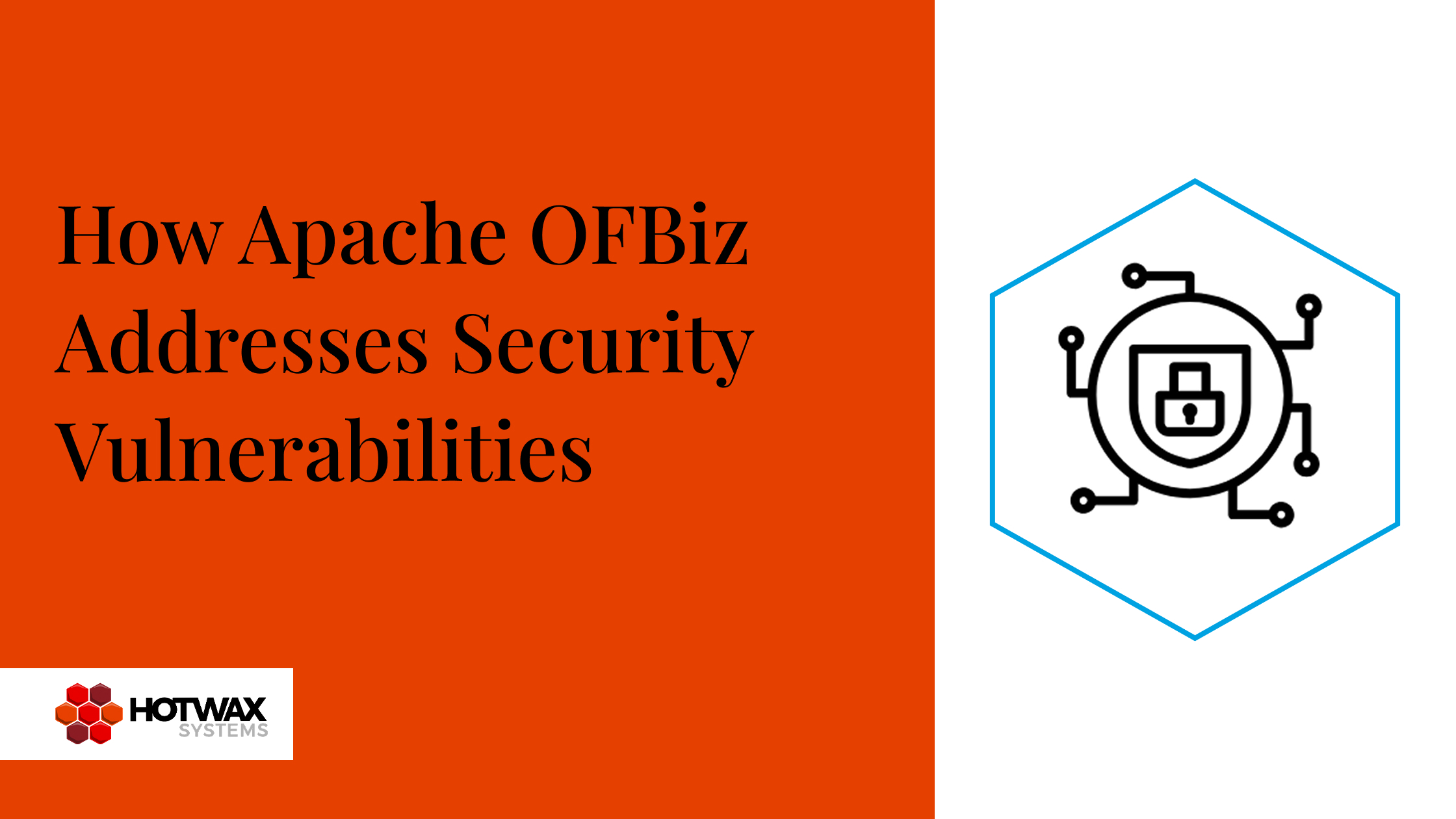In today’s digital landscape, securing enterprise software is not just a best practice — it’s a business imperative. Security breaches can cost organizations millions of dollars, damage their reputation, and erode customer trust. For companies evaluating Apache OFBiz as their business automation platform, it’s natural to ask how secure is Apache OFBiz, and how seriously the community takes software vulnerabilities.
As an open-source project under the Apache Software Foundation (ASF), Apache OFBiz follows a well-structured, transparent, and community-driven approach to identifying, fixing, and disclosing security vulnerabilities. This blog explores why security matters for businesses considering Apache OFBiz as the foundation of their digital operations, what security vulnerabilities are, how the Apache OFBiz community addresses them, and what are the responsibilities of IT teams.
Why Secure Software Matters?
Enterprise Automation Systems, like Apache OFBiz, sit at the heart of an organization’s operations, e.g. managing orders, inventory, finance, human resources, customer relationships, and more. That makes them a high-value target for cyber threats. A single vulnerability, if left unaddressed, can lead to unauthorized data access, service disruption, or even manipulation of core business logic.
For businesses, securing their automation systems isn’t just an IT concern, it’s a core part of operational resilience, compliance (such as GDPR, HIPAA, or PCI-DSS), and risk management.
What Are Security Vulnerabilities?
A security vulnerability is a weakness in software that can be exploited to compromise the confidentiality, integrity, or availability of that system. These vulnerabilities may arise from coding errors, outdated dependencies, misconfigurations, or unforeseen interactions between system components.
In the global cybersecurity ecosystem, vulnerabilities are tracked using Common Vulnerabilities and Exposures (CVEs), standardized identifiers that help researchers and security professionals track and communicate about threats consistently.
The Apache OFBiz Approach to Security
The Apache OFBiz project adheres to the Apache Software Foundation's policies and best practices for security. The ASF’s long-standing reputation for responsible open-source stewardship is reflected in Apache OFBiz’s approach to vulnerability handling.
Here’s how the community handles security issues:
1. Reporting
Anyone — including users, contributors, volunteers, or security researchers — can report a potential vulnerability. Reports are confidentially submitted to the Apache Security Team.
2. Validation and CVE Assignment
Once received, the members of the Apache OFBiz Security Team carefully review the report. If a vulnerability is confirmed, it is assigned a CVE identifier and tracked through an internal process until resolution.
3. Fix Development
The Apache OFBiz Security Team implements a patch or fix. This work is done securely and privately until the fix is ready, to avoid exposing users to active threats.
4. Release and Disclosure
The fix is included in an upcoming software release. Once released, the CVE details are made public, along with guidance on how users should update or patch their systems.
This workflow ensures that vulnerabilities are handled promptly, transparently, and responsibly — in line with global standards.
Real-World Examples of Vulnerabilities handled by the Apache OFBiz Security Team
Here is a list of a few recent examples of vulnerabilities handled by the Security Team.
CVE‑2024‑48962 – Template Engine Code Injection and Cross-Site Request Forgery (CSRF)
Severity: High
Impact: This issue involved a combination of code injection and Cross-Site Request Forgery (CSRF) in OFBiz’s template engine, a critical backend component. If left unpatched, attackers could have executed unauthorized actions or injected malicious scripts.
Fix: Addressed in version 18.12.17
CVE‑2024‑47208 – Server-Side Request Forgery (SSRF)
Severity: Critical
Impact: This vulnerability allowed attackers to craft external requests from within the server, potentially leading to exposure of internal systems or escalation of access. SSRF attacks are among the most dangerous in cloud-based environments.
Fix: Addressed in version 18.12.17
CVE‑2025‑30676 – Stored Cross-Site Scripting (XSS)
Severity: Medium
Impact: This frontend vulnerability allowed malicious scripts to be stored and triggered through user interface elements. If exploited, it could compromise session data or redirect users to malicious sites. XSS is one of the most common yet impactful web vulnerabilities.
Fix: Addressed in version 18.12.19
The examples above show that both frontend and backend threats are handled and for each of them prompt and precise fixes are provided.
For a full list of reported and resolved vulnerabilities, you can visit the official Apache OFBiz Security page.
The Trend: Increasing CVE Reports, Increasing Maturity
To understand the security posture of Apache OFBiz, it’s helpful to look at the project’s CVE disclosure history. The graph below shows the number of CVEs reported per year since 2011:

What This Graph Tells Us:
A Sign of Popularity and Community Engagement: The increasing number of CVEs reported in recent years reflects growing adoption of Apache OFBiz and more eyes on the code — a key strength of open-source development.
Mature Vulnerability Handling: Rather than seeing CVEs as a sign of insecurity, they demonstrate the project’s openness, accountability, and the presence of an active user and contributor base.
Commitment to Continuous Improvement: Over time, Apache OFBiz community members have consistently responded to reported issues, issued patches, and kept users informed. This kind of transparent security management is a hallmark of mature open-source projects.
Responsibilities of IT teams
Security is never a one-time checkbox — it’s an ongoing process. If your organization is considering Apache OFBiz as an ERP, Order Management, Procurement Management, or Manufacturing Planning and Execution System, you want a platform that evolves with the threat landscape. Apache OFBiz meets that need.
However, it’s not enough to rely solely on the community. Businesses must also take responsibility for:
- Keeping systems up to date with the latest Apache OFBiz releases
- Applying patches promptly
- Auditing and securing their own customizations
That’s where the right implementation partner can make all the difference.
Work With a Trusted Apache OFBiz Expert
At HotWax Systems, we’ve been part of the Apache OFBiz community since its early days. In fact, our team includes a large group of Apache OFBiz committers— including members actively contributing to security fixes.
For instance, one of the CVEs highlighted earlier in this blog — CVE‑2024‑48962, a high-severity issue involving code injection and CSRF — was resolved under Jira ticket OFBIZ-13162 by Deepak Dixit, an Apache OFBiz committer and PMC member from HotWax Systems.
These contributions reflect our ongoing commitment to not just implementing Apache OFBiz for our clients, but also shaping and securing the platform itself.
Our services include:
- Ongoing security updates and patch management
- Secure custom development
- Cloud infrastructure review and hardening — while Apache OFBiz is typically hosted on platforms like Amazon Web Services (AWS) or on company’s private infrastructure, our team ensures that the deployment is configured securely and aligns with best practices
- Proactive audits and performance monitoring
Final Thoughts
The Apache OFBiz community has demonstrated a strong and consistent commitment to managing security vulnerabilities. With well-defined processes for CVE handling, a growing contributor base, and the backing of the Apache Software Foundation, Apache OFBiz stands as a reliable and transparent enterprise software automation platform.
Security-conscious organizations can confidently adopt Apache OFBiz — especially when backed by experienced partners who understand both the technology and the stakes. With an active security culture and support from service providers, Apache OFBiz is well-positioned to meet the evolving needs of modern enterprises.



